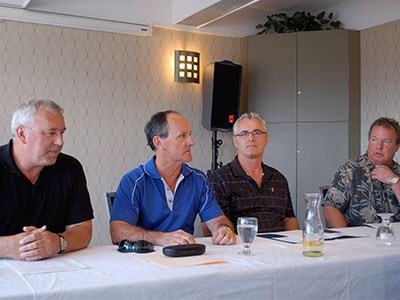The unions of the Ontario Northland Transportation Commission (ONTC) insist no one is working on any option other than divestment of the North Bay-headquartered Crown agency.
“This is causing great uncertainty and anxiety among the workers and their families at Ontario Northland,” said Brian Kelly, spokesperson for the General Chairperson’s Association (GCA), which represents all unionized employees, during a July 25 press conference.
“Thus far, from the CGA’s perspective, no one is taking a leadership role on developing that viable option to divestment.”
The association wants to participate with a special advisory committee and enter into stakeholder talks to decide the ONTC's future.
But the unions said their repeated requests for a meeting with Premier Kathleen Wynne and Minister of Northern Development and Mines Michael Gravelle over the last eight months have gone unanswered. “Over that time, the government has not applied to any of our overtures,” said Kelly. “We know with certainty that no one is working on an option,” added Brian Stevens, Canadian Auto Workers national representative.
Last year, Rick Bartolucci, then-minister of Northern Development and Mines, announced the surprise divestment of the ONTC, citing rising operational costs, and then launched a process to sell off the railway, maintenance shops, bus routes, and telecommunications division. No assets have been sold off to date, but the uproar from across northeastern Ontario caused the new Wynne government to stand down from its divestment stance and select a minister's advisory committee to consider other scenarios.
Cloaked in confidentiality, the appointed collection of mayors, industry heads and First Nations representatives regularly meet with Gravelle and receive technical briefings to discuss a long-term solution that satisfies all stakeholders.
In an interview, Gravelle reiterated his statement made in May, backed by the premier, that, “I did not think divestment is the only option,” and repeatedly emphasized that the ONTC cannot continue to operate under its current structure.
“Our goal, since I became minister, is unchanged: to ensure that the communities and industries that are part of the ONTC benefit from an efficient transportation and communication system.”
The unions said they have tried to reach out to the advisory committee.
“We want to play a role in it,” said Stevens. “We know the status quo won't work.” Gravelle acknowledged labour representation on the committee is absent so as not to jeopardize the collective bargaining process.
“If there's any message I can send to the union membership it's that they are very important partners in this process.”
The unions are championing the creation of an inland port authority under federal legislation to make the Ontario Northland the exclusive rail hauler of chromite ore and base metals out of the James Bay lowlands' Ring of Fire.
“That was received by the government as just a union scheme,” said Stevens of their “New Deal” proposal. “We are prepared to discuss all business models.”
With some collective agreements expiring this year, the unions said the timing of these discussions would coincide with that.
Gravelle said he understood the unions met with Bartolucci last year with the expectation that a formal business proposal was coming.
“We haven't seen that yet and I think it's fair to say that it's difficult to respond to a proposal unless there's an actual business plan.”
Gravelle refused to speculate if some of the unique public-private arrangement is under discussion and gave no indication when all these meetings might produce a tangible result.
“We are determined to make the best decision that will see the long-term sustainability of the ONTC.” www.ontarionorthland.ca




